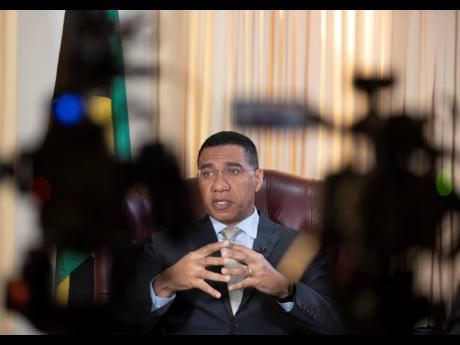PM: Crime ‘above our capacity’ ... But investments in personnel, tech will bear fruit, says Holness
Amid a spike in murders across Jamaica, Prime Minister Andrew Holness has admitted that the country’s crime problem has “evolved currently, over and above our established capacity to address it”.
Despite the imposition of states of emergency in almost half the police divisions across the country, murders have soared by 10 per cent since the start of the year when compared with the corresponding period in 2019.
In an exclusive interview with The Gleaner on Tuesday, the prime minister said that his administration was fighting back by deploying technology, systems, and increased personnel to tackle what many believe is Jamaica’s number one problem.
“What we are doing now, in an intense way, is to put in place resources, systems, and personnel integrated with technology to address the crime situation,” Holness told The Gleaner at Jamaica House.
Arguing that the crime surge was not a recent phenomenon, the prime minister suggested that an inadequate allocation of resources in the country’s security apparatus over 30 years had resulted in the current state of affairs.
No quick fix
Signalling that cramping crime was not an overnight assignment, Holness said it would take time to reduce the current levels of violence in the society.
“I am confident that we are at a good place now in terms of the investments that we have made, and those investments will bear fruit,” said Holness, whose administration has pumped an additional $2 billion into the national security budget for fiscal year 2020-2021.
Holness, who has defended the imposition of states of emergency despite calls from the parliamentary Opposition for the Government to employ other strategies, noted that the use of extraordinary powers by the security forces has helped to reduce the frequency and intensity of crime.
He said that the SOEs have lowered “the volume (of crime) a bit, and whilst we have this respite, we are using it to improve our police stations – conditions under which police personnel work – we are using it to introduce greater technology”.
But despite that assurance, the reduction in crime in six of the eight police divisions under states of emergency has not applied cumulative shock to the criminal underworld. Instead, murders have ballooned in most other non-emergency zones, with St Andrew North recording almost 270 per cent more killings this year than in 2019. Up to February 22, when the latest police stats were issued, there were 22 murders in St Andrew North – and the body count there continues to increase, with another homicide on February 25.
More than 210 Jamaicans have been murdered this year at a rate of almost four a day.
PRESSURE ON GANGS
The prime minister said, however, that the efforts of the security forces were bearing fruit with the number of gangs that had been targeted and brought before the courts.
At present, Uchence Wilson, an alleged gang leader, and 17 of his alleged cronies are on trial for breaches of the Criminal Justice (Suppression of Criminal Organisations) Act 2014, commonly known as the anti-gang legislation, between 2015 and 2017. A ruling is expected soon.
At the same time, six alleged members of the Westmoreland-based King Valley Gang are on trial for breaches of Criminal Justice (Suppression of Criminal Organisations) 2014 in relation to crimes committed between 2016 and 2018.
However, there have been prosecutorial pitfalls as well, with 19 alleged members of the Westmoreland-based Dexter Street Gang walking free last October. In that case, the prosecution’s main witness, a self-confessed member of the gang, had died.

